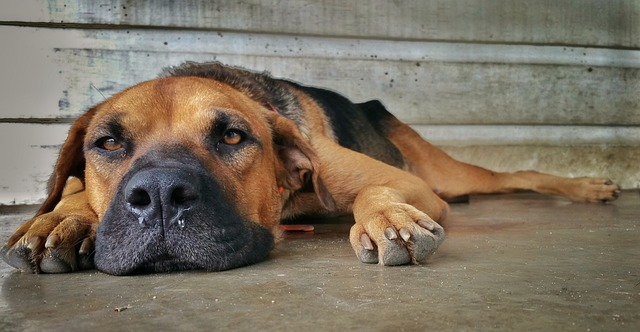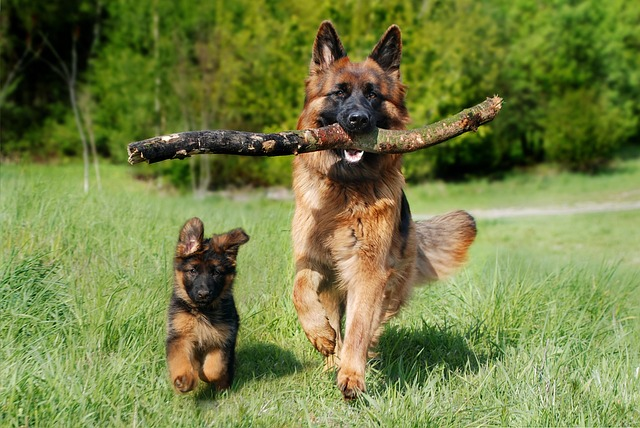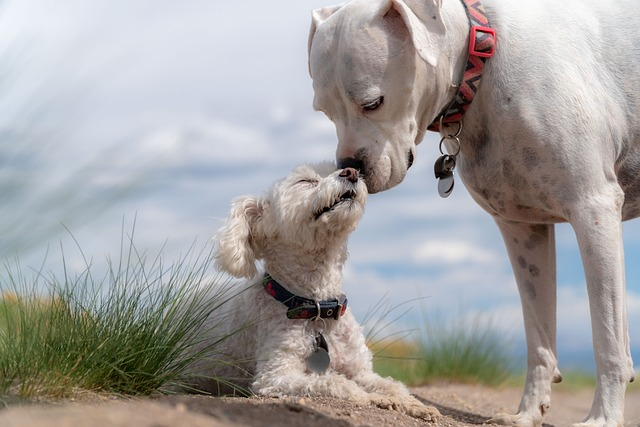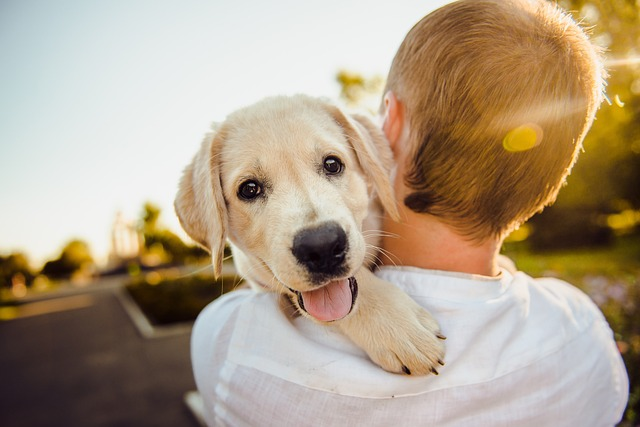What Causes Dog Diarrhea and How to Help Your Pet Feel Better
On any given week, Dr. Kordell’s veterinary office will field hundreds of calls for dog diarrhea. This can get as high as 70% of calls. You are not alone in being concerned about your dog’s diarrhea symptoms. Learn more about the signs and causes of dog diarrhea below.
As a loving dog owner, it’s disheartening to see your furry companion suffering from diarrhea. We’ve all been there, anxiously Googling symptoms and potential remedies, trying to alleviate our pup’s discomfort. Understanding what causes dog diarrhea and its treatments is crucial to helping your pet feel better, and that’s exactly what this comprehensive guide is all about.
Short Summary
- Dog diarrhea can be acute or chronic, with dietary factors, infections and parasites being common causes.
- Identifying symptoms such as dehydration and presence of blood/mucus in the stool is important for diagnosis.
- Veterinary care should be sought when necessary. Preventative measures like proper diet and exercise will reduce the risk of recurrence.
Understanding Dog Diarrhea

Dog diarrhea is characterized by the accelerated passage of fecal matter through the intestines, resulting in decreased absorption of water, nutrients, and electrolytes. In some cases, diarrhea can be a mild and temporary inconvenience, while in others, it may indicate a more serious health issue.
In this section, we’ll discuss the difference between acute and chronic diarrhea, along with their respective causes and treatments.
Acute Diarrhea
Acute diarrhea in dogs is a brief episode that typically resolves itself in a short period of time. Common causes of acute diarrhea include dietary indiscretion, stress, bacterial infections, or parasites. For instance, your dog may have eaten something they shouldn’t have, such as table scraps or spoiled food.
In many cases, acute diarrhea can be managed at home with simple remedies like a bland diet, fiber supplements, and adequate hydration. If your dog’s diarrhea continues for more than 48 hours, or is accompanied by other symptoms, it is important to seek veterinary attention. It is always best to get a professional opinion from an experienced vet.
Chronic Diarrhea
Unlike acute diarrhea, chronic diarrhea in dogs is a more serious condition that may be caused by underlying health issues, necessitating veterinary attention. Potential causes of chronic diarrhea include conditions such as pancreatitis, inflammatory bowel disease, and even cancer.
The consequences of chronic diarrhea can be severe, leading to weight loss, dehydration, and a weakened immune system. Because of the potential risks associated with chronic diarrhea, it’s vital to seek veterinary care as soon as possible to address the underlying cause and provide appropriate treatment.
Common Causes of Diarrhea in Dogs

As we’ve touched on earlier, there are various factors that can contribute to diarrhea in dogs, such as dietary factors, infections, and parasites.
In this section, we’ll delve deeper into these common causes, helping you better understand how to prevent and address dog diarrhea.
Dietary Factors
Dietary factors are among the most common causes of diarrhea in dogs. Sudden changes in diet, ingestion of table scraps, and food allergies can all lead to an upset stomach and diarrhea. To prevent this, it’s essential to gradually introduce new foods to your dog’s diet and avoid giving them human food that may be harmful or difficult for them to digest.
Some foods that might trigger diarrhea include fatty foods, dairy products, human junk food, and spoiled or contaminated food. By being mindful of your dog’s diet and sticking to high-quality, specifically formulated dog food, you can significantly reduce the risk of diarrhea caused by dietary factors.
Infections and Parasites
Infections and parasites are another common cause of diarrhea in dogs. Giardia, Salmonella, and Coccidia are just a few examples of infections and parasites that can wreak havoc on a dog’s gastrointestinal tract. These infections can be contracted through contaminated food, water, or contact with other infected animals.
If you suspect that your dog’s diarrhea is caused by an infection or parasite, it’s crucial to seek veterinary attention for proper diagnosis and treatment. Your veterinarian may recommend tests to identify the specific infection or parasite and prescribe appropriate medications to help your dog recover.
Underlying Health Conditions
Diarrhea can also be a symptom of more serious underlying health conditions, such as pancreatitis, inflammatory bowel disease (IBD), or even cancer. These chronic conditions often require ongoing veterinary care to manage symptoms and improve your dog’s quality of life.
If you notice that your dog’s diarrhea is persistent or accompanied by other symptoms, such as weight loss, lethargy, or vomiting, it’s vital to consult your veterinarian for further evaluation and treatment. Addressing underlying health conditions early can significantly improve your dog’s prognosis and overall well-being.
Identifying Symptoms Associated with Dog Diarrhea

In addition to loose or watery stools, there are several other symptoms that may be associated with dog diarrhea. Recognizing these symptoms can help you determine the severity of your dog’s condition and whether veterinary care is necessary.
In this section, we’ll discuss symptoms such as dehydration and the presence of blood or mucus in the stool.
Dehydration

Dehydration is a common symptom of dog diarrhea, as the increased fluid loss can lead to an imbalance in the body’s fluid intake and output. Signs of dehydration in dogs may include a dry nose, dry gums, sunken eyes, and lethargy. If you suspect your dog is dehydrated, it’s crucial to seek veterinary attention promptly to prevent further complications.
To help prevent dehydration in dogs with diarrhea, it’s essential to ensure they have access to clean, fresh water at all times. Encouraging your dog to drink water can help replenish lost fluids and support their recovery.
Blood or Mucus in Stool
The presence of blood or mucus in your dog’s stool can be an alarming symptom that may suggest a more serious underlying condition. Blood in the stool can appear as red or black streaks or as a slimy, mucus-like substance. Potential causes of blood or mucus in the stool include infections, parasites, dietary issues, and other health conditions.
If you observe blood or mucus in your dog’s stool, it’s important to consult your veterinarian for further evaluation and treatment. Early intervention can help address the underlying cause and improve your dog’s prognosis.
Treating Diarrhea in Dogs: Home Remedies and Veterinary Care
When it comes to treating diarrhea in dogs, there are numerous home remedies and veterinary care options available, depending on the severity and underlying cause of the condition.
In this section, we’ll discuss various treatment strategies, from home care tips to more advanced veterinary interventions.
Home Care Strategies
There are several home care strategies that can help alleviate your dog’s diarrhea symptoms and support their recovery. First and foremost, it’s important to allow your dog some rest and avoid any strenuous activities that may exacerbate their condition. Fasting your dog for a short period (about 12-24 hours) can also help give their digestive system a break and promote healing.
After fasting, you can gradually reintroduce food by offering small amounts of a bland diet, such as boiled chicken. Be sure to provide plenty of fresh water to help prevent dehydration.
Other home care strategies include adding fiber supplements like canned pumpkin to your dog’s diet. Always consult your veterinarian before trying any new home remedies or supplements for your dog.
When to Seek Veterinary Help
While many cases of dog diarrhea can be managed at home, there are situations where it’s necessary to seek veterinary help. If your dog’s diarrhea persists for more than 48 hours or is accompanied by other concerning symptoms, such as vomiting, weight loss, or severe bloody diarrhea, it’s recommended to schedule a vet visit.
Early treatment is crucial for a better prognosis, so don’t hesitate to contact your veterinarian or an emergency hospital for further advice if you’re unsure about your dog’s condition. Your veterinarian can guide you on the appropriate course of action, which may include diagnostic tests, medications, or even hospitalization, depending on the severity and underlying cause of the diarrhea.
Prevention and Prognosis for Dog Diarrhea

Now that we’ve covered the causes, symptoms, and treatments for dog diarrhea, let’s discuss prevention and prognosis. By implementing preventative measures, you can minimize the risk of diarrhea in your dog and ensure their long-term health and well-being.
Preventative Measures
One of the most effective ways to prevent diarrhea in dogs is to avoid sudden diet changes and feed them high-quality, specially formulated dog food. Additionally, refrain from giving your dog table scraps or human food that may be harmful or difficult for them to digest.
Other preventative measures include keeping your dog’s vaccinations and parasite prevention up-to-date, as well as providing plenty of fresh water and regular exercise. By implementing these strategies, you can help ensure your dog’s digestive system remains healthy and reduce the risk of diarrhea.
Prognosis and Recovery
The prognosis and recovery outlook for dogs with diarrhea is generally positive, provided you seek timely treatment and address the underlying cause. In most cases, dogs with acute diarrhea will recover quickly with the appropriate home care and dietary modifications.
However, for dogs with chronic diarrhea or diarrhea caused by an underlying health condition, the prognosis may vary depending on the specific issue and the success of the treatment plan. By working closely with your veterinarian and following their guidance, you can improve your dog’s prognosis and overall well-being.
Specially Formulated Dog Foods for Diarrhea

In some cases, specially formulated dog foods can be beneficial in alleviating diarrhea symptoms and promoting digestive health.
In this section, we’ll discuss the ingredients to look for in dog food for diarrhea and explore some brands and options available.
Ingredients to Look For
When selecting dog food for diarrhea, it’s important to look for ingredients that support digestive health and are gentle on the stomach. Probiotics, prebiotics, fiber, and omega-3 fatty acids are all essential ingredients for promoting a healthy digestive tract and immune system. DiarRice has the right pre- and probiotic blend to address symptoms of diarrhea in dogs.
Brands and Options
There are several brands and options available for specially formulated dog foods for diarrhea. Some of these include Royal Canin Veterinary Diet Gastrointestinal Low Fat Canned Dog Food, Hill’s Prescription Diet i/d Digestive Care Dry Dog Food, and Purina Pro Plan Veterinary Diets EN Gastroenteric Formula Dry Dog Food.
Each of these options contains ingredients that are easy-to-digest and gentle on the stomach, making them ideal for dogs with diarrhea. Be sure to consult your veterinarian before switching your dog’s food to ensure it’s the right choice for their specific needs and health condition.
Summary
In conclusion, understanding the causes, symptoms, and treatments of dog diarrhea is essential to helping your furry friend feel better. By implementing preventative measures, providing appropriate home care, and seeking veterinary help when needed, you can ensure your dog’s digestive health remains in top shape. Remember, our pets rely on us to keep them healthy and happy, so always be vigilant and proactive in addressing any health concerns that may arise.
Frequently Asked Questions
What do you give a dog for diarrhea?
It’s important to help soothe your pup’s tummy troubles with a bland diet for a day or two and DiarRice. Try feeding them a little bit of chicken and canned pumpkin (not pumpkin pie filling). Once their diarrhea has settled, you can start to reintroduce their regular food. This should help get their digestion back on track.
When should I be concerned about my dogs diarrhea?
If your dog has diarrhea lasting for more than two days or if there is any change in stool consistency, contact your veterinarian as soon as possible.
If your dog has severe bloody diarrhea, is showing signs of illness such as weakness, fever, vomiting, abdominal pain, loss of appetite, or dehydration; has black or dry diarrhea; has not eaten; or the diarrhea does not resolve within 48-72 hours, seek medical attention right away.
What are common causes dog diarrhea?
Common causes of dog diarrhea include dietary indiscretion, switching to a new food too quickly, ingestion of foreign objects, ingestion of toxins or poisons, viral infections, and parasites.
Stress or anxiety can also contribute to diarrhea in dogs.
What if my dog has diarrhea but is acting fine?
If your dog has diarrhea but is acting normally, you should take preventative measures such as withholding food for a short time and then reintroducing a bland diet.
If the condition persists, consult your veterinarian as soon as possible.
